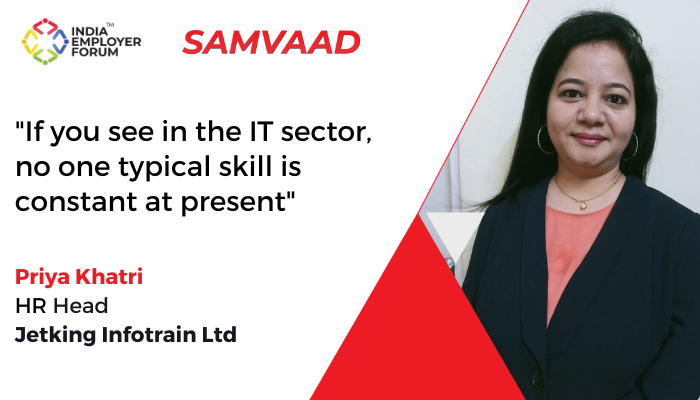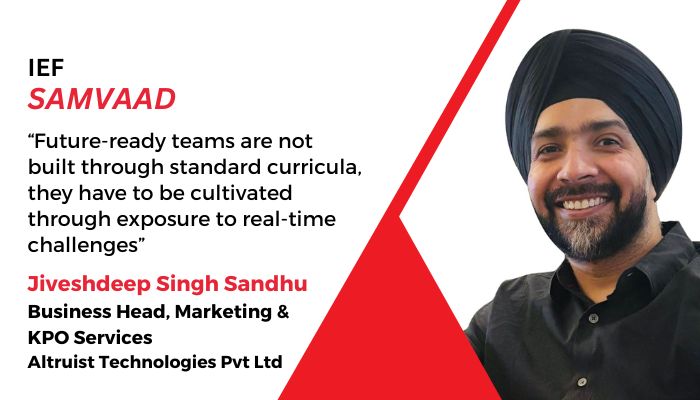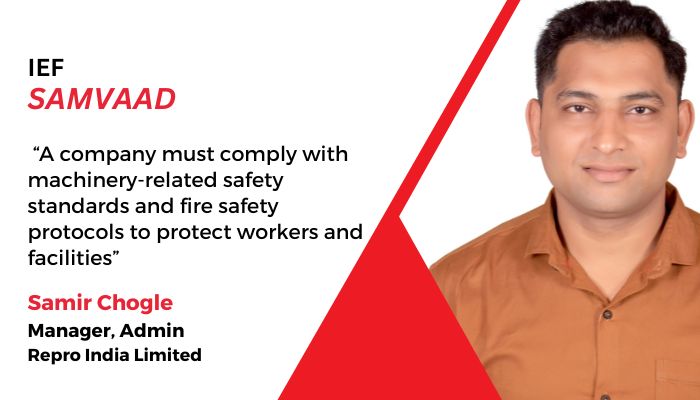Priya Khatri, HR Head, Jetking Infotrain Ltd, speaks to India Employer Forum about the employability crisis of graduates in India, looming recession fears and how to stay prepared, expectations from the budget and many more.
Q. With Jetking being in the training space, what steps do you as an HR Head take to tackle the employability gap for your recruitment pipeline?
The employability gap is one of the major challenges that the industry as well as the nation as a whole faces altogether. If we see, 50% of the population in India itself is unemployed. So Jetking is taking a majority of the plans for the employment of the population. As Jetking is in the educational sector itself, one of the things that Jetking promises is 100% employability to each and every person who has been scoring and who has been taking education from Jetking. On the basis of the HR fraternity as well, a few strategies that we have put up for employability are basically developing the culture of talent development. Nowadays, what we lack is the development of talent.
That is not only moving into the job and doing their work but also upskilling and upgrading oneself into various technologies, something that is booming in the sector nowadays. And specifically, if you see in the IT sector, no one typical skill is constant at present. Every new week there is some new technology which comes into the market and the person wants to learn and get upgraded, and that is one of the cultures which we are focusing on and enhancing ourselves within the organisation for the employability gap. Secondly, reinforcing the value of the learning that we are making mandatory for each and every employee to learn to get self-initiated.
Q. With the uncertainty in the global economy and recession fears looming, what do you think are the most critical aspects in preparing for such an event?
The recession was one of the most booming fears in the market during the Covid and most people lost their jobs without any reason. But one of the sectors which were booming even during COVID was the IT sector. During this period, we have also learnt that opportunity lies wherever there is a problem. And during this period, people started maintaining confidence in themselves. From jobs, they moved on to entrepreneurship. They have been dealing with things in the way of the creation and innovation that is there in the market. From an HR point of view, at this moment, as we have come out of this era, still there is a point of view wherein we see that recession can hit any nation, not only India, any nation at any moment at any time. So few of the initiatives that we take as an HR strategy is educating the people on various things such as education of financial planning. This era has taught us how financial planning can be done.
There was a period wherein there was no financial planning done by the person as an individual and that is where the problem has come up. So, nowadays, one of the things that have been emphasised in the organisation is educating the people on financial planning, on different types of spaces that they can invest in and how they can gain interest from these savings and how that can be used in the future as one of the possibilities. Secondly, we are also emphasising preparing the managers for coaching and mentoring the employees in the world of upskilling and upgrading.
Q. What is the most critical investment that companies need to make today to gain an unfair advantage in the long run?
The most important investment that an organisation has to put is talent management and talent development. It has to focus more on the digitisation of the culture in the organisation, digitisation of the HR forum and the organisation. Because everything should be available at a click of an employee. If we go digital, even the training which has been happening can be done in one go. The person can anytime anywhere do the training, upskill himself and can invest his time in the management of himself, that is building self-confidence of the person and also skilling. This also helps in skilling an employee within the organisation, which helps them for the betterment of the future as well.
So digitisation is one of the things that I would suggest or I would add up in this forum that is one of the major things that needs to be put up in each and every organisation, and this period which will bring in the future along with the talent management that is to retain the talent. We need to upgrade them, we need to show them a career path, we need to show them where they would reach after five to ten years. And that is what will build up a culture, trust within the organisation, and loyalty from an employee to the organisation as well, and which will also help in the management of the employees.
Q. What are your 5 biggest expectations from the budget this year?
Budget is a major and one of the most important and interesting topics for each and everyone, whether the person is employed, not employed, working or sitting at home. Because a Budget is basically a blueprint of what you would be doing and how you would be spending in the coming year. So, my major expectation from the budget is to lower the interest rate for loans, especially for the educational sector. When a person wants to do higher education, a major concern that some of the average people may come across is financials. So, these financials can be taken over if they can take an educational loan. So, one of the major aspects is that if the government can rule out the rate of interest on the educational loan or they can lower the rate of interest for this kind, which will help for the investment of the future and career developments as well.
Second, it could be a boost for employment and provide helping hands to the various sectors, bringing up more government jobs in various sectors altogether. Not only IT but various sectors, which will help in the development and employment of the population. Third, I would like to say that to increase the benefits of the income tax slab rates, by increasing the 80C slab and similarly the other deductions. The difference that we have seen is, we have brought from 2.5 to 5 lakhs but there hasn’t been any kind of an internal change in the slab rates, or you can say 80C & 80D, and so on. So additional benefit of these interest slab rates would really help if something can be thought upon on these topics during the budget.
Watch the full interview: In Conversation with Priya Khatri, HR Head, Jetking Infotrain Ltd
About Priya Khatri
Priya Khatri comes with 14+ experience, handling a gamut of HR functions in diversified sectors, be it IT, ITEs, telecom and Education. She is currently heading the HR function with a focus on a strategic approach in Jetking Infotrain Ltd, a pioneer in the EdTech industry with a legacy of 75 years. Prior to this, she was working with Capgemini as an HR business partner for over 10 years. Priya is a lifelong learner who invests a lot in upskilling and has done a few certifications from Harvard Business School. She is also interested in coaching and consulting and loves to interact and work with people across the levels and participate in various HR forums.






